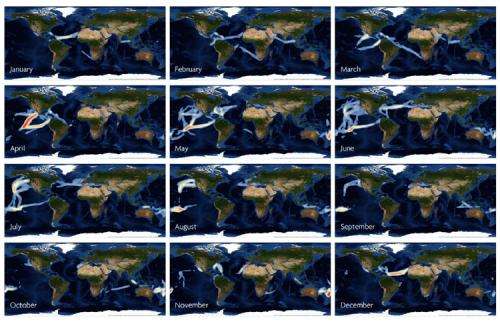Citizen science model proposed to fill fundamental ocean data gap

Despite new technologies, satellite imagery and modern research methods the work of collecting routine, fundamental data about the Earth's oceans' physical, biological and chemical characteristics remains an unforgiving and impossible task that has challenged scientists for centuries.
A pioneering approach published today in the open access, peer reviewed scientific journal PLOS Biology challenges conventional research methods and proposes a global effort to engage and empower citizen scientists to gather basic ocean data aboard small vessels on the most common sailing routes.
Such data would significantly improve the accuracy of climate models, weather forecasts and even assist search and rescue efforts struggling to learn the likely trajectory of floating debris left by a plane crash or other incidents.
"The ocean is too vast for any vessel to sample very much of it, no matter its capabilities," said report co-author Joseph Grzymski, an associate research professor of computational biology and microbiology at Nevada's Desert Research Institute. "Maximizing the number of observers, rather than the advanced capabilities of observers, requires a very different approach to the choice of vessel, personnel, instrumentation and protocol."
Grzymski, lead expedition scientist of the Indigo V Indian Ocean Expedition – a pilot study in 2013 to test the aptly named "citizen oceanographer approach" across 6,500 nautical miles from Cape Town, South Africa to Phuket, Thailand – explained that observing your surroundings while aboard a sailing yacht is part of daily life at sea. Those observations, combined with a newly developed, simple and reliable technique for bacterioplankton sampling could be deployed and recorded by sailors – who have an inherent concern for the oceans and make ideal candidates for citizen scientists. Bacterioplankton, collectively known as the 'marine microbiome', serve as the backbone to the ocean's nutrient cycle and the food web.
While aboard S/Y Indigo V, a 61-foot sailing yacht, the Indigo V team spent four months developing and testing new sampling instruments adaptable to citizen scientists and common cruising yachts. In all but the heaviest seas, the crew was able to inventory surface water populations of bacterioplankton and make basic measurements of ocean physics and chemistry. Later, DNA and RNA were successfully recovered from samples the crew preserved using a non-toxic salt solution.
"Our project demonstrated that with simple instruments and basic training sailors can sample a wide range of waters and collect meaningful data, comprising the largest global oceanographic monitoring network to date," said Federico Lauro, director of the Indigo V Expeditions and associate professor and microbial genomics expert at the University of New South Wales, Australia and Nanyang Technological University in Singapore.
"Moreover," Lauro added, "with wind power alone we demonstrated that an entire four-month voyage cost the equivalent of one day of ship time aboard an oceanographic research vessel."
Oceanography has long been an extremely expensive scientific discipline. Expansive budgetary cuts to environmental sciences around the globe and the concurrent need to renew an aging fleet of ocean research vessels underscore the urgency for a different approach.
The authors explain this revolutionary citizen oceanographer approach would cost significantly less than traditional research methodologies and lead advancements in the field of ocean health. Additionally, it would improve science education and increase public awareness of ocean acidification and the unprecedented challenges facing the world's oceans today.
Journal information: PLoS Biology
Provided by Desert Research Institute



















